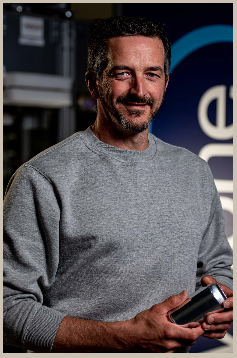Last year there was an uproar and worry when Ball Corp announced that it was increasing the minimum order on printed cans. There has also been concern that many of the vinyl stickers going on blank cans are mucking up the recycling stream. As brewers look for ways to get cans in front of customers and many are looking for eco-friendly options, a relatively new technology has emerged that provides on-demand printing on a small scale, allowing brewers to only order what they need.
John Holl spoke to Sébastien Baril the president of SoluCan in Québec, a company that is working with the technology, to learn more.
John Holl: Can you tell me a bit about the company? When was it founded and what is its mission?
Sébastien Baril: Solucan was founded in late 2019. The owners and operators come from the Food Packaging Industry with more than 25-years of experience each. That year we started production on a line dedicated to the 12oz format. In January 2020 the company saw its first sales but by February COVID caused global can shortages.
The company was recognized by a number of different groups and companies for innovation and disruption in the beverage space and in December of 2021 we installed the 2nd production line dedicated to the 16oz can.
Our mission is to help consumers reduce the pollution they generate by avoiding the production of 100,000,000 cans containing single-use plastic by 2030.
John Holl: What is the benefit of small-batch can printing?
Sébastien Baril: Versatility. Digital means no printing plates and very little setup time. That brings total freedom to our customers on the brand side. They can play with their designs at each product release. On the commodity-type business, digital means extreme speed-to-market.
John Holl: What is the durability of the printing? Can it stand up to filling, transport, and storage like other printed cans?
Sébastien Baril: Coming from the Food packaging industry, we know that can printing is not all about esthetics. Print robustness comes also at the top of the list. Because customers perception towards the brand they choose won’t be the same if the can does not sustain the filling and distribution processes.
John Holl: Is can printing better than vinyl labels?
Sébastien Baril: Yes. Environmentally, adding another type of material on a 100% recyclable package makes no sense. So direct print is better for the planet as less waste is generated when recycling the aluminum. Also, on the supply chain side, the just-in-time capabilities of direct digital print is unbeatable.
John Holl: What is your outlook for the printed-can marketplace in the coming years among breweries?
Sébastien Baril: Canned beverages are trending. More and more products are being launched. Digital offer is ramping up. Those factors will very quickly make the digital can the solution of choice for the small/medium beverage manufacturers.
